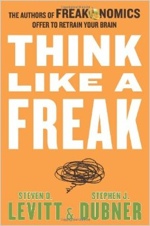"Think Like A Freak" Book Writeup
July 14, 2014
 Think Like a Freak: The Authors of Freakonomics Offer to Retrain Your Brain
Steven Levitt, Stephen Dubner
ISBN: 0062218336
Think Like a Freak: The Authors of Freakonomics Offer to Retrain Your Brain
Steven Levitt, Stephen Dubner
ISBN: 0062218336
What’s the point?
The authors of Freakonomics go meta and explain the thought process they use to analyze and
approach problems in a different way. Thinking “like a freak” means using data and tracing
incentives instead of looking for evidence that supports our own initial hunches.
How was it?
Readers familiar with Freakonomics (or other books in this genre) know that these
kind of books feed on anecdotes to help you remember key points. This is no exception.
To remember the concept of “letting a garden weed itself”, you might remember the story of how Zappos offers new employees a cash bonus to quit soon after they start (to allow people only motivated by money to self-select out). When you come up against an artificial barrier, remember how Kobayashi broke the hot-dog eating world records by redefining the problem.
My favorite story was about the idea of prize-linked savings accounts. Instead of trying to guilt people into saving money, a bank can tap into something deemed “bad” — in this case gambling — and spin it into a positive. A prize-linked savings account is like a normal savings account, except that a portion of the earned interest is placed into a shared pool that periodically pays out a lump sum to a randomly selected winner. You get the fun and excitement of PowerBall, but at the end of the day, you still have your existing principal amount tucked away safely.
Who should read it?
It’s a quick and enjoyable read. I would recommend it to anyone that enjoyed Freakonomics or
that is looking for some inspiration on thinking outside the box.
